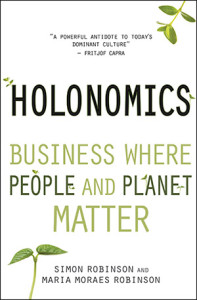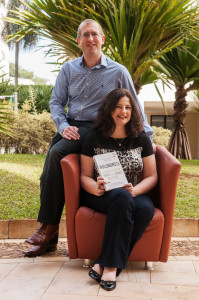New Year, New You: Simon Robinson and Maria Moraes Robinson discuss Holonomics and Balanced Scorecard
by Floris Books • 29 January 2015 • Alternative Business and Economics • 0 Comments
All through January, here on the Floris Blog we will be celebrating the new. New ways of thinking, new ways of interacting with the world around us, and new ways of living and working meaningfully. New year, new you!
Today we invite you to join Simon Robinson and Maria Moraes Robinson, authors of Holonomics, as they think about the practical implications of holonomic thinking in organisations. If you haven’t encountered holonomic thinking before, then have a quick read of our great FAQ blog post first.
 Simon: As you can imagine, Maria and I have many interesting discussions about lots of things, and we love to have deep dialogues where we explore our thoughts on complexity, strategy and wholeness amongst other things. We recently talked about Balanced Scorecard, one of the world’s most popular tools for the development and execution of corporate strategy. In Brazil, Maria is widely regarded as one of the country’s leading experts in this field, and so I thought it would be interesting to share her thoughts not only on how a holonomic comprehension of wholeness can lead to better implementation of strategy, but also on why leaders now need to be truly authentic leaders, in order to be able to manage their organisations in the complex reality in which we find ourselves.
Simon: As you can imagine, Maria and I have many interesting discussions about lots of things, and we love to have deep dialogues where we explore our thoughts on complexity, strategy and wholeness amongst other things. We recently talked about Balanced Scorecard, one of the world’s most popular tools for the development and execution of corporate strategy. In Brazil, Maria is widely regarded as one of the country’s leading experts in this field, and so I thought it would be interesting to share her thoughts not only on how a holonomic comprehension of wholeness can lead to better implementation of strategy, but also on why leaders now need to be truly authentic leaders, in order to be able to manage their organisations in the complex reality in which we find ourselves.
Maria: The Balanced Scorecard methodology developed by Robert S. Kaplan and David Norton in the 1990s is now the fifth most used management tool by business executives in the world [Bain & Company’s Management Tools and Trends Survey]. Balanced Scorecard is a powerful tool to link strategy to the operational part of an organisation, via the use of strategic maps.
The traditional way of seeing the company was to assume that if we can optimise each part, everything will go well. But when you have a strategic map, you have the vision of the company, not the vision of the parts. You develop objectives for the company and not objectives for the parts.
Organisations who operate Balanced Scorecard with holonomic vision develop knowledge that, while specific to one particular department or area, is always developed in the name of the whole. When you have a system that allows you to see this whole, you can help people develop dialogue and exchange knowledge, allowing knowledge to flow, develop and be retained within the organisation.
Simon: And what does this mean for leadership?
Maria: Balanced Scorecard is a powerful tool to link strategy to the operational world. If it is being applied in a proper environment where people really understand the meaning of both Balanced Scorecard and strategic maps, where they understand the real meaning of cascading the strategy, and of aligning people in the same direction based on a clear proposal, leaders no longer start to see a separation between the long and short term, between strategy and operations, as if each thing was different.
In projects that work, the leadership want to create a more meaningful company. They really care about people and what they are doing in the company, and the meaning of their work. They really want to communicate this. They want to develop a true sense of purpose in people. They believe that strategy can only happen in the day-to-day work. The long term can only be reached if today everyone works towards some vision, based on true values.
Nowadays we work in complex environments. Balanced Scorecard and strategic maps help develop coherence between the different parts of these environments. When you understand that not only do the parts depend on the whole, but that also the whole depends on the parts, then you really understand Balanced Scorecard.
Simon: An insight from Holonomics is that the systems view takes you away from a focus on finished objects, and towards a focus on processes within systems. So are you saying that strategic maps help managers see the processes?
Maria: That’s correct. Strategic maps help managers see the processes of an organisation and also provides them with a broader view than just the company. Managers come to see the interactions and relationships with the outside environment. The relationship with the community in which the organisation belongs, and its impact on the environment can be put into the strategy, empowering managers to think about a wider range of issues which relate to the business ecosystem.
Simon: Could you talk a little bit about Part One of Holonomics, “the dynamics of seeing”? What does this mean and how do you work with it?
Maria: I have been inspired by the phenomenological philosophy and insights that we write about in Holonomics to create exercises which allow executives to actually experience just how much our mental models shape and filter our view of reality. This for me is the dynamics of seeing. My goal is to lead executives to the astonishing insight that they do not have an exclusive claim to the truth about reality, leading them to better understand just how much true dialogue is required for them to fully make sense of complex situations.
Leaders can no longer see themselves as the one person in an organisation who has all the answers. Leaders need to be able to both initiate and nurture participation in dialogue, and also participate in it. Before leaders can use dialogue to help people and themselves change their mental models, they have to move from an ego-centric world view to an eco-centric world view. In order to have a true dialogue, you have to have detachment from your own point of view and in order to be able to listen to others. This can only come about when the values of a leader are truly authentic, based on human values such as love, peace, righteousness, truth and non-violence.
Join us on the Floris blog and over on Twitter @FlorisBooks #NewYearNewYou where during January we’ll be sharing insightful articles and blogs from our growing collection of books on alternative business.
More about Holonomics and its authors
 Simon Robinson is a consultant in innovation, strategy and complexity. He was one of the founders of Genie Internet, the world’s first mobile internet portal and is a member of Biomimicry for Creative Innovation (BCI). He has a Masters degree in Holistic Science from Schumacher College, UK.
Simon Robinson is a consultant in innovation, strategy and complexity. He was one of the founders of Genie Internet, the world’s first mobile internet portal and is a member of Biomimicry for Creative Innovation (BCI). He has a Masters degree in Holistic Science from Schumacher College, UK.
Maria Moraes Robinson is an economist and consultant in strategy, change management and the ‘Balanced Scorecard’ management tool. She is a teacher and lecturer, interested in the themes of the economics of happiness and human values in education, and is the co-author of Strategy Management: Experiences and Lessons of Brazilian Companies and The Strategic Activist.
Holonomics is available now in paperback and eBook from florisbooks.co.uk.